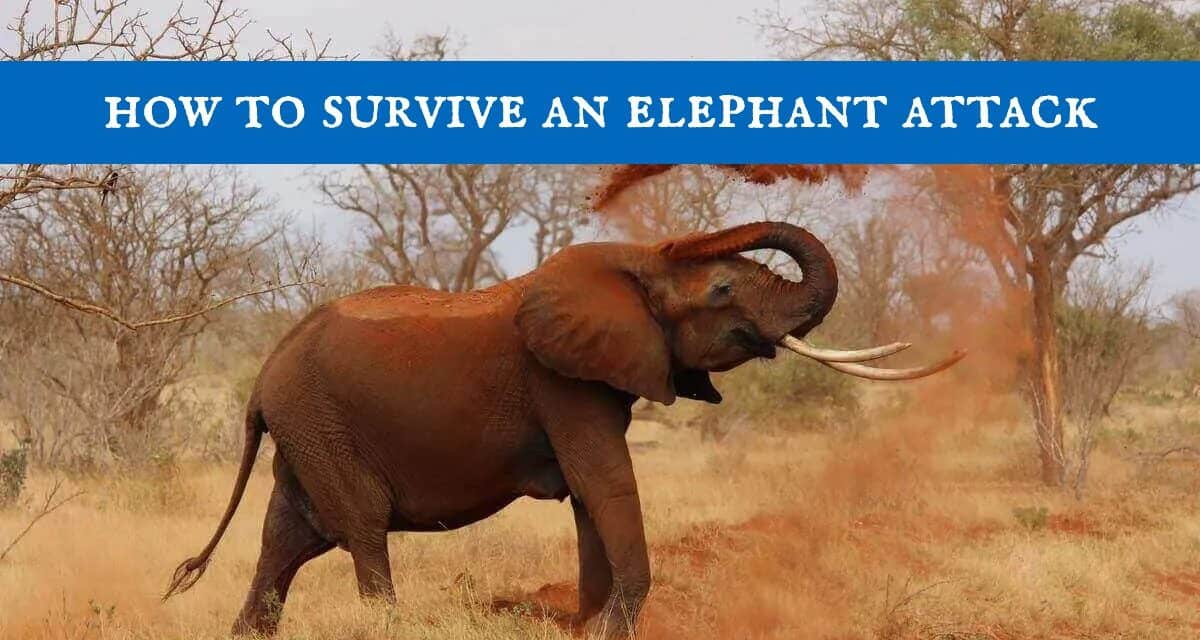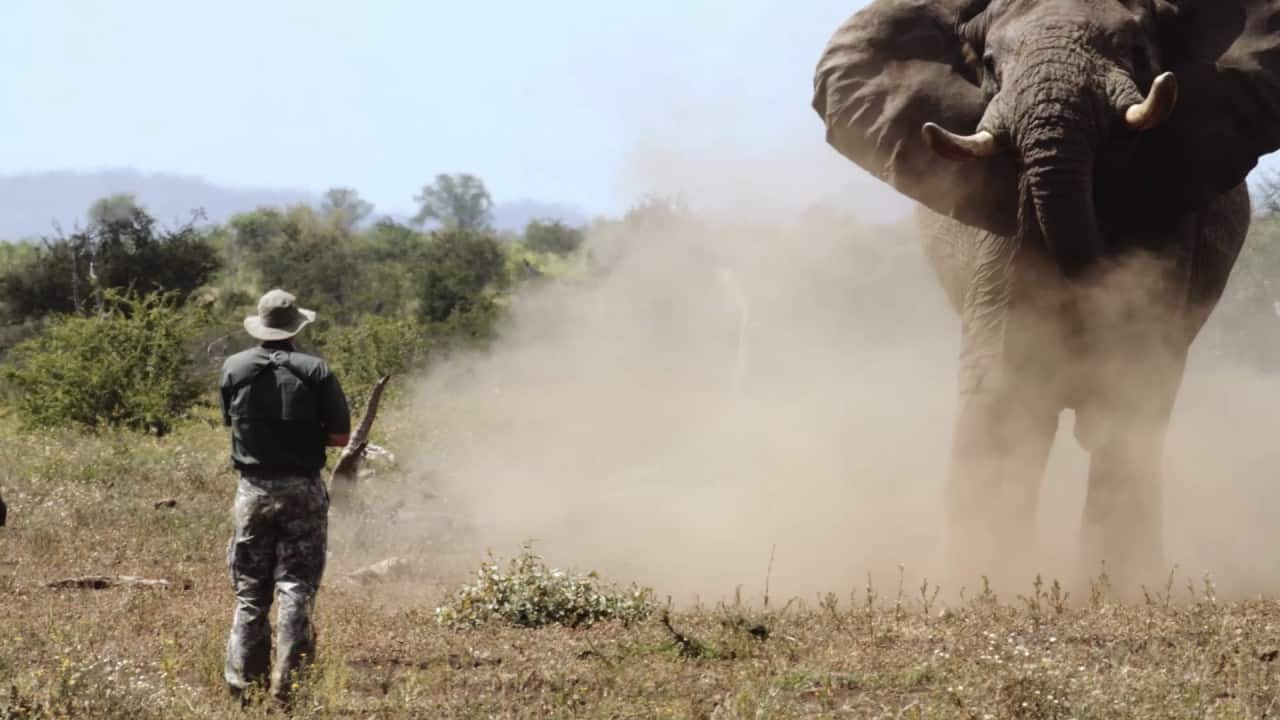Table of Contents
Guide to surviving an elephant attack
After the recent elephant attack in Selati Game Reserve 2 days ago, there has been some discussion on some online groups and forums about how that incident could have been prevented as well as how one would survive an elephant attack.
People travel halfway across the world to see elephants in the wild and there is no better place than a countries national park but beware of being attacked by an elephant.
SCENARIOS TO AVOID WITH ELEPHANTS
If you see a herd of elephants from afar, you should keep your distance and give them plenty of space. However, there are a few particular scenarios that are even more prudent to avoid.
- Bulls during musth – they are full of testosterone and extra aggressive.
- Don’t sneak up on a herd. Nobody likes getting spooked, and a scared elephant is prone to charge.
- Don’t threaten or approach a baby elephant. This probably seems obvious, but herds fiercely protect their young and will take extraordinary measures to make sure they’re safe.
- Keep food away from your dwelling. Food might entice a hungry elephant to come too close, and driving away hungry elephants while they’re feasting makes for unhappy elephants!
An #elephant attacked a jeep with students during a safari in southern Africa. People managed to escape and got off with just a fright, but the car got it. The moment of the attack is on the video. pic.twitter.com/PHNblI9iBf
— Aleksander Onishchuk (@Brave_spirit81) December 1, 2021
Here is a quick guide to surviving an elephant attack
Recognize a bluff. Is the elephant mock charging
Know When You’re In Trouble. If the elephant’s ears are pinned back and the trunk is close to its body.
Keep Changing Direction. If you are in a position to run, always run in a zig-zag pattern. Elephants hate changing directions
- Use chemicals. If you are not in a position to run and you have pepper spray of something similar, spray it in the direction of the charging elephant.
How to survive an elephant attack Guide
If you have ever been the victim of an elephant attack, you’ll know that the situation can be very traumatic and dangerous. Luckily, there are some ways to survive the situation. For example, you should avoid approaching the herd when it’s close by. It’s best to stay downwind and stay calm. Also, don’t approach any baby elephants – they’re fiercely protective of their young.
It’s important to get away as quickly as possible from an elephant attack. Whether you’re approaching an elephant for the first time or are already in the vicinity of an elephant, it is best to use a loud voice to scare them away. The elephant will react to this by setting its ears back and tucking its trunk close to its body. In addition, it’s best to avoid standing still if you’re not sure what to do.
You should also learn how to recognize an elephant when it’s charging. If you’re near one, a soft voice will be helpful. Oftentimes, elephants will stop their bluff charge behavior when a human approaches. Then, try to beat your chest in order to make it look bigger. You can also yell to scare them away if you’re not scared of them.
The first thing you should do is avoid being near the elephant. The elephant will try to kill you won’t be able to escape. You should avoid standing close to the elephant, which will increase their fear. If you’re afraid, try to hide behind a large tree or a big rock. This will help you stay safe. This is a crucial step in surviving an attack. If you do this, you’ll be able to escape the animal and get away in time.
You should stay as quiet as possible when facing an elephant. Remember that you’ll have to remain still if you’re faced with an aggressive elephant. You should also stay stationary in a crowded area. While the elephant will not test charge you, it will only try to scare you if they sense you’re provoking them. Aside from that, you shouldn’t run or make sudden movements when facing an animal. You should try to stay quiet and avoid the animal as much as possible. If you’re attacked by an elephant, keep as calm as possible.
The best way to survive an elephant attack is to avoid the animal. If you’re the target of an attack, you should be aware of its movements. This will allow you to escape the animal. If the animal doesn’t see you, it will attack an object instead. This way, you’ll have a chance to get away from the elephant. Once you’re away from the animal, you can avoid the elephant’s attention.
While the elephants will be scared of humans, they are still terrified of bees. They only run at the top speed if they’re angry. This means that you’re more likely to be attacked if you don’t run. You should also know that the animal can’t climb trees. This is why they’re so afraid of people. However, they can be attacked by a lion or a tiger.
It’s best to stay calm if you’re facing an elephant. You should not make a loud noise, but if you’re near an elephant, you should make noise. A roaring elephant can kill you. If you’re a human, you should make a loud noise to distract it. A lot of times, the attackers don’t hurt the victim. They just want to steal your food.
The best way to survive an elephant attack is to make noise. You can try making noise to warn the elephant. This will deter the elephant from charging you. If the elephant doesn’t know that you’re nearby, then you’ll need to run. Otherwise, they’ll think you’re hunting. Therefore, it’s crucial to keep yourself away from the animal. This way, you can avoid the possibility of being eaten.
HOW TO SURVIVE AN ELEPHANT ATTACK?
If an elephant does attack-charge you, it will use its tusks to gore you, throw you and crush you. It will often keep stomping until you’re dead. Since elephants can plow down trees, flip cars, and run up to 40km an hour, you have little chance of outrunning them. So your best bet is to read the signals early and recognize if you are seeing a bluff charge or a real charge. Here is what you do in each case.
If you read the body language and believe it’s a bluff charge, do the following:
- Stay calm. This sounds counter intuitive.
- Show them you’re not a threat. Remember, they’re smart and if they’re exposed to humans regularly they can read your body language. This means talking in a soft voice, not waving your hands or beating your chest. If all goes well, the elephant will stop any bluff charge behaviors and eventually appear docile.
- Give them space. Remember, the elephant just wants you out of their personal space. It doesn’t mean you need to run. I suppose if you can run and you’re wearing good sneakers, maybe go for that.
- If they keep approaching in spite of your calm, yelling becomes an option here. It shows that you are not intimidated and could be a threat yourself if they approach more. Let’s hope this is as far as it gets.
If it’s not a bluff charge, you’re in serious trouble. This is what you’re best advised to do:
- Run – and run in a zig-zag pattern. This utilizes your smaller mass. Hopefully they can’t change direction as fast as you.
- Get a large object between you and the elephant – the bigger the better. Don’t forget that they can flip cars and plow through small shrubs.
- Don’t climb a tree unless it’s a massive tree. Let’s face it, that tree will have to be really big or the elephant will just knock it down. Plus, so many of the trees in Africa are full of thorns. You’re better off using your energy running.











